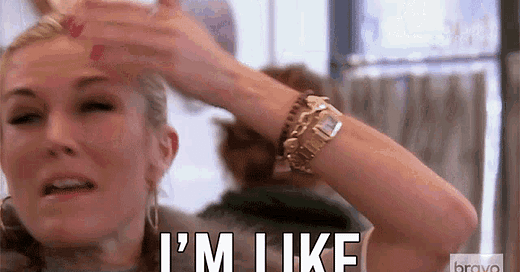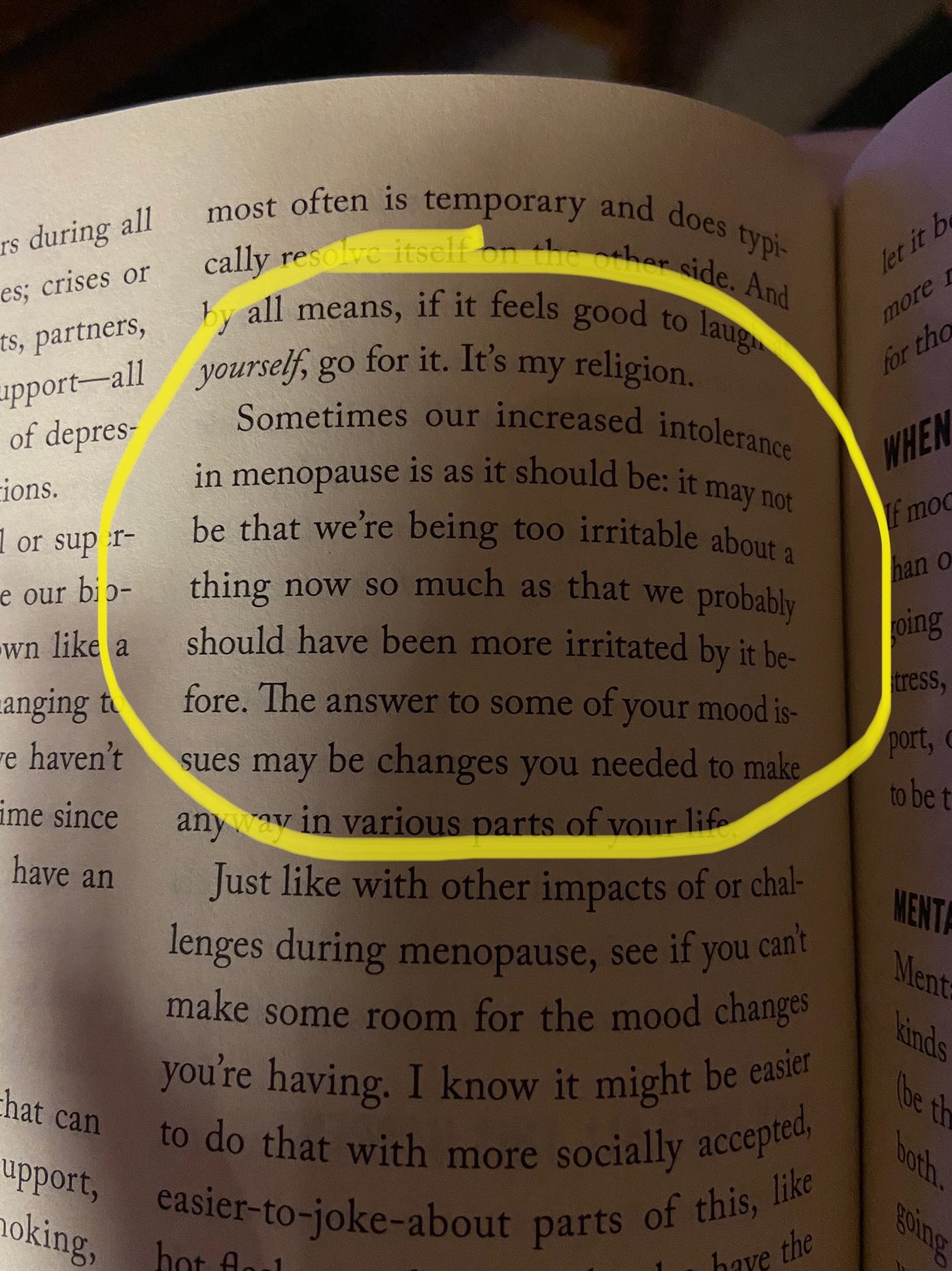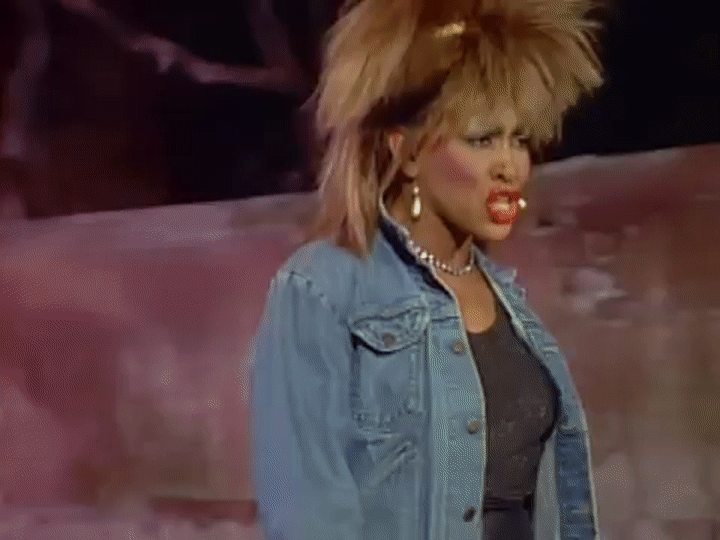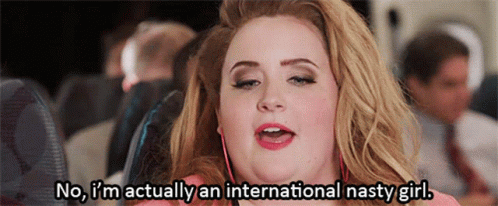When the night sweats came, I was pissed. It took many years of getting our kids to stay in their beds reliably every night, and it finally seemed like it was time to enjoy the sweet reward of that hard work. But then I began waking up with my pajamas and sheets wet. At first it only seemed to happen the week leading up to my period, so I shopped for cropped pajama pants to soak up the sweat, found comfy sleep bras to wear as tops and got a prescription for Ambien to try to sleep through it. But then it started happening more often than not, to the point where I’d need to do a complete outfit change in the middle of the night. I didn’t want to take Ambien more than a few days a month.
I was in denial about this being a symptom of perimenopause (I’ll be 43 in April.) I had experienced a hot flash or two during my waking hours as well but wasn’t quite sure if it was also possibly anxiety or too much coffee or the onset of a bug. Then, one night, I spent several hours in bed freezing, as if I was quite ill, then boiling, then cold but sweaty. The next morning, I was fine. I Googled what you can do about hot flashes and night sweats and the answers were basically:
Stop drinking alcohol
Maintain good sleep habits
Exercise
Maintain your weight
All of which I already DO. I felt robbed. Ten or so years of this while I just patiently wait for my period to dry up? I called a friend who I know had been on a wild perimenopause journey and, she recommended I call my ob/gyn, prepare to have to find another doctor if my own didn’t believe in the severity of perimenopause symptoms (because many don’t), and that I check out Heather Corinna’s book What Fresh Hell is This? Perimenopause, Menopause, Other Indignities, and You.
As I waited for Heather’s book to arrive at my bookstore, my sympathetic doctor prescribed a low dose birth control. And amazingly, my night sweats have stopped and I even have been sleeping later. So I’m glad I went and asked about it and that I have access to someone who could help me. It’s been a bit of an adjustment going back on hormonal birth control for the first time in six years, but I would gladly trade better sleep for some extra zits and spotting.
Reading Corinna’s book, meanwhile, made me realize so much about this time of life. Aside from the night sweats, a lot of shit I’m dealing with lately that I thought was just depression, just the pandemic, just being a spoiled brat were actually probably perimenopause, including the mounting number of tired or sad days per month, the new inability to recall certain words or names as quickly as possible, the sudden stabs of grief recalling my kids being littler despite always thinking I’d never be like that because I’m not the type who needs her children to be dependent babies.
And I just loved this quote:
Heather may be best well-known for their teen sexual health resource site Scarleteen; they put their experience running that resource to work in the book, which, unlike most others on the topic, is inclusive towards people who are not white, cisgender, have given birth, married, have easy access to medical care, and so on. Heather also does thoughtful work sourcing a variety of experts that specialize in the populations the book addresses. I spoke with Heather about their book on a snowy day between Christmas and New Years:
I was looking at the pub date, and I couldn’t believe that it only came out in June 2021. I’m shocked that this book hadn’t existed until just this year. Tell me a little bit about how you looked at the landscape, what you saw out there when you realized that this book needed to exist.
I tend to wait on pitching new books until there’s an availability with my favorite editor, Renee Sedlíar, who will come, like she did this time, and be like, “Okay. Do you have a book list?” I’ll be like, “Oh my God, it’s time. I do.” I had given her my book list, which was this whole long list of things. At the very bottom of the list, and only because I was having a shitty, shitty perimenopause day, was I like, “Grumble, grumble, grumble. Or some crummy book about crummy perimenopause, blah, blah, blah.”
I was kind of kidding. I was not actually serious. Because Renee received this email on a day when Renee was also having a shitty perimenopause day, Renee was like, “That one.” Then I was like, “Ah, no.” Then it was a minute where it’s like then you were like, “Am I serious? Do I want to, what? Fuck.”
The thing with health information that makes writing them such a bear is, even when you write them, by the time you’re literally ready to turn it into your editor you’re racing to fact check everything one last time, and you’re still changing shit. Then you’ve turned it in. In the two rounds of editing before it’s finally done, you’re still like, “Aw, shit.” Between last edit and publish, you’re like, “There’s stuff that’s outdated now,” as it’s going to print.
From a quick glance, I knew as a nonbinary person there wasn’t anything. I knew as a queer person there wasn’t shit, too. It was just so obvious that there wasn’t much of anything that was going to serve me. And I did have the idea that the entire conversation about this was, the only thing that I could do was take estrogen or not take estrogen anyway. My mother had estrogen sensitive breast cancer. I know from my mother that being in perimenopause and having cancer at the same time fucking sucked.
I don’t like being like, “Well, I’ll provide the thing that doesn’t exist before,” because that is not the most fun trip to take, even though so much of what I wind up doing is, in fact, providing the things that didn’t exist before. I certainly knew that there wasn’t anything very inclusive in a lot of ways. I knew from even doing research that, as somebody that’s not even particularly dysphoric, it sucks to have to read information that doesn’t include you.
The interesting thing is, anytime I’ve been having these conversations with people about inclusivity, the right people know what I’m talking about. People that don’t need it assume that that’s only about gender or queerness. They don’t realize that, if you’re fat, reading almost everything on menopause is a horror of an experience. There’s fatphobia everywhere. If you’re disabled, looking at almost everything out there sucks, because there’s ableism entrenched in all of it. If you’re Black or of color, there’s racism through all of it. So much of it is written for people of a certain class. Who this information and who this care has been built for is a very specific person. It’s been written often by that same person for that same person.
Prior to reading your book, I guess I was under the impression that menopause was the main attraction, the big tent, and perimenopause was sort of new thing, the appetizer. Now, I realize that they are completely different. Perimenopause is not a new thing. It’s not a lesser thing. What have you discovered as a huge misconception about the difference between perimenopause and menopause?
Well, I thought like you did., I’ve always had, I’ve had awful horrible, painful periods. (It’s past tense now. It’s so weird.) I would throw up for two days. I’d be in horrible pain. The idea I had is that I would feel like shit with these periods. Then I would reach menopause, and then there would be this whole new level of shit, right? I did have this hope that at least with the crap with my periods, that would go away. Then I thought I would just be crabby, and have bone loss, and not want to have sex anymore. It’s humiliating to think about the ignorance that I had around it. Especially since I work in sexuality and reproductive health. I should know these things. Also, there’s no shame in us not knowing things. It’s not our fault that we don’t know these things. Where would I have learned these things? There’s a reason that we’re only learning them now. I think that that shame that we didn’t know things can shut down a lot of conversations. It also can create a lot of divisions to think, “Well, there’s some people that know things. Then there’s the people that don’t know things.” It’s like, “You know what? When it comes to this, most of us have not known shit.”
The sad thing is, so often too we don’t know until we’re so far along in it. The hope is that if we’re talking more and more about it out loud, hopefully when people are at the beginning, maybe even before people start, they will have more some preparedness. If maybe you might have a bad time because of factors you can’t change, it might be much more manageable.
Menopause itself, when we’re not using it as an umbrella term to describe this whole entire journey and adventure that starts with perimenopause and goes until we’re dead, is a moment. Menopause is at most a day — just the moment when, if you had regular periods or whatever, when it’s it’s been a full year since you had periods. When your periods and cycles are all done, and you’re not going to have them anymore.
After that, it’s all far more predictable when it comes to what’s happening with your hormones and their impact on you. It’s just this slow, gradual change of a decline, primarily of estrogen and progesterone. Testosterone is declining too. It’s slow and gradual and declining for the rest of your days. There’s no peaks and valleys. It’s predictable. On the other hand, the lead up to that, when all of this gets started? Perimenopause is a rollercoaster.
Hormones in peri are all over the place. It’s chaotic. It is massively different from person-to-to person, with when things are high, when things are low, in what order it happens. How it all impacts you is also very different. Even later on, that decline is still going to be different, because we’re not all in the same body. We haven’t lived the same life, and we don’t live the same conditions, but it’s still a little more similar for everybody than it is in perimenopause. Peri and what goes on in it is all over the freaking place for people. There’s no predicting.
I think this is another misconception. I had it too, and a lot of doctors still have it. You will have doctors still tell you, “Well, let’s test your hormone levels and see where you are.” In perimenopause, there’s usually no sound reason to do that. Your estrogen one day could be, and often is, totally different the next day. Nobody could say, “Well, your estrogen is here, so here’s how far you are from menopause.” They can’t do that. They would have to literally be testing it every single day for months and months and months. Later is when you start to see that that is settling a little bit. Moving more towards that, shifting more down and less of the big, giant kooky bananas tango from hell. That’s a misconception.
I think the other misconception it’s just hope and optimism. Many of us will think that perimenopause is like six months. It’s not. It’s one of those things where we can know where it ends, and we can never know for sure where it started. We can’t. There’s a million reasons why we don’t have the exact scientific answer, and that it’s not the same for everybody. Everybody has a different amount of time. I think that everybody should count on a decade of their life. If it’s not, you’re going to be super pleasantly surprised. If it’s about that, or it’s more than that, you’re at least prepared.
Something I noted during the start of the pandemic, especially during the lockdown period, was how many friends of mine who are still menstruating, how messed up their periods were, I imagined due to the stress of the pandemic. Do you think there’s a wide generation of people whose perimenopause and menopause has been altered in some way due to the stress of the pandemic?
Absolutely. The cohort of people who are in perimenopause in pandemic are a very unique cohort. When all of this is said and done, I guarantee you that there will be a lot of study on this particular group of people, almost expressly for that reason. One, they’ll want to do things around COVID and they’ll want to do things around vaccines. I absolutely think that stress, and all the things that are related to stress, cortisol, all the chemicals and neurochemicals around all of this play a huge part here. There’s so many things even beyond stress. It’s things like the difference of what it means to be in our homes. Think about the period of time that we couldn’t even be going for walks, both from a stress management point, but also just from a movement point of view.
Because there’s stress and then there’s also what we do to manage stress. Both of those things, were radically different in the pandemic. Both our stress was amplified, and so much of what so many of us do to manage stress was either taken away or it changed in such a way. Even somebody that says they do yoga at home. If there’s all of a sudden three children climbing on you, and your partner’s having their work and their Zoom or whatever, that’s not happening. You could try all you want, but you’re not going to be getting the same thing out of it that you got out of it before. It is not going to be helping with your stress levels anymore. Both the level of stress that everybody was carrying, and the fact that so many of the ways that we are able to manage stress were taken away from us absolutely had an impact.
My gynecologist put me on this low dose birth control, and it’s actually been working pretty well. Does that count as hormone replacement therapy, if you start a birth control pill?
I like to not call it hormone replacement therapy, because it’s not necessarily replacing anything. There’s no “right” amount of hormones for us to have, there’s just whatever our levels are and what we want. I like to say just hormone therapy here, or you could call it menopause hormone therapy. HT or MHT. That’s one of the things that’s important, to change that thinking I had. That’s like, “Oh, you get this giant estrogen patch and or you have nothing.” Now the pill did not work for me. I think me and estrogen are a bad mix. But for others, I think a lot of people start to think, “Oh, I’m over 35. I should think about going off of it.” When for a lot of people who are around that age, it might help them with perimenopause. So they absolutely should not be going off of it. That’s a kind of hormone therapy. An IUD is a kind of hormone therapy for this. Low dose testosterone is a kind of hormone therapy for this.
If you’re on a 28 day pill or an IUD, and you don’t get periods, can you just keep on IUDing until you get through my menopause eventually?
Yeah. In fact doing that, in early perimenopause it’s usually not a lack of estrogen that’s a problem. In fact, estrogen is often high in early perimenopause, not low. Progesterone is what is often a missing piece and a problem in early perimenopause. When somebody’s doing a hormonal IUD that has progesterone in there, that can actually help. If you do an estrogen, you want a progesterone to balance it out, to protect you against uterine cancer. That can be right in there to be the progesterone that balances it out, and then it’s already taken care of.
A reader asked, “I have insomnia. I’ve never smoked pot in my life. Should I start cannabis?”
I certainly think that that is one thing that is worth a try. I’ll say it as a pothead, it’s a good sleep aid for a lot of people. You definitely want to go ahead and have a chat with somebody at your dispensary, if you’ve never smoked before, about brains and things that are helpful for sleep. You don’t want the perky shit, because it’s not going to help you out.
This is ultimately a sleep issue. You can sleep through the night. You don’t need a menopause expert at the dispensary. You just want to talk to somebody and be like, “I need help with sleep.” Let them suggest something. Over-the-counter sleep aids, like the stuff and the pills and whatever that you buy, that’s always stuff to be careful with, quite frankly. That shit’s just kind of dangerous. I would always say that if you can see a healthcare provider, you want to talk to somebody about that stuff. You can try lots of tea. My partner just accidentally had some serious valerian root tea the other day, and that seemed to do a thing. Some of it too is that you can try different timing with your exercise, if that’s one big thing to wear yourself out. Masturbation, if it works for you.
In the book you mention being able to identify which artists’ albums are menopausal vs. post-menopausal. What are some of your favorites from that stage of life?
Well I mentioned Stevie Nicks post-menopausal Trouble in Shangri-La in the book. I’m pretty sure that Turbulent Indigo was Joni Mitchell’s menopausal. World Without Tears, if Lucinda Williams had an average peri/meno, probably would have been her post-menopausal album, and so Essence and Car Wheels on a Gravel Road would have been peri, if you can deal with that amazingness! Patti Smith’s post-meno was probably the genius Gone Again, Emmylou Harris’ was probably the OMG so amazing Wrecking Ball, and one of my favorite to think about is that both of Tina Turner’s first two solo albums, Private Dancer and Break Every Rule probably spanned across her peri/menopausal transition. I MEAN. Just whoah.
End credits
Thanks for reading Evil Witches, a newsletter for people who happen to be mothers. Forward it to someone who could maybe use this. If you haven’t yet I hope you consider becoming a paid subscriber, which supports the time it takes to conduct, edit and publish the interviews for issues like these and this gets you extra subscriber-only content like discussion threads and extra stories covering things like our favorite appliances, tiny victories, and jewelry stores that advertise with the premise that men hate thinking about getting engaged.
If you have any questions, feedback, or suggestions for the newsletter you can reply to this email or talk to other witches on Twitter. The archives live here.
One witchy thing
This is just a brilliant thing I heard from a friend when I asked her what the Tooth Fairy gives her (three) kids when they lose their teeth:
“Usually a mixture of different currencies because she’s so well traveled. ‘Wow, the tooth fair goes to Canada and Mexico a lot!’







Guess who woke up sweaty in the middle of the night the last 2 nights in a row? ;)
Thank you for this post! This book has been on my list to buy for a while, and now I'm just going to do it. Roughly same age as you, definitely got the night sweats. Also, I used to work with Renee Sedliar! She is the best and it was such a delight to see her name here and her part in the creation of this important and necessary book!